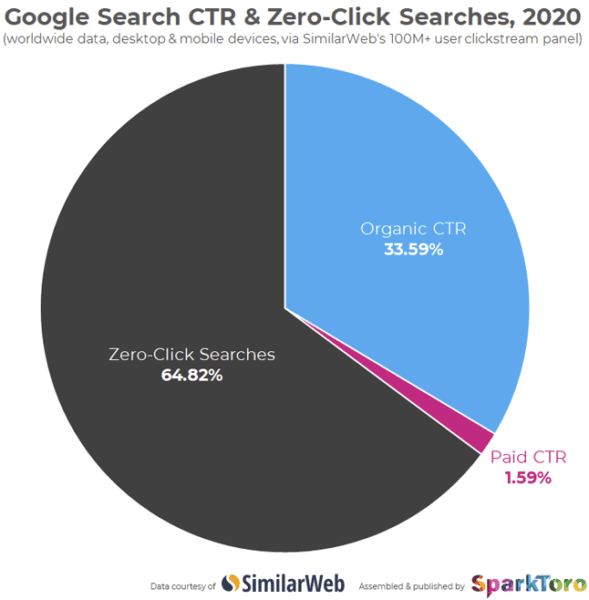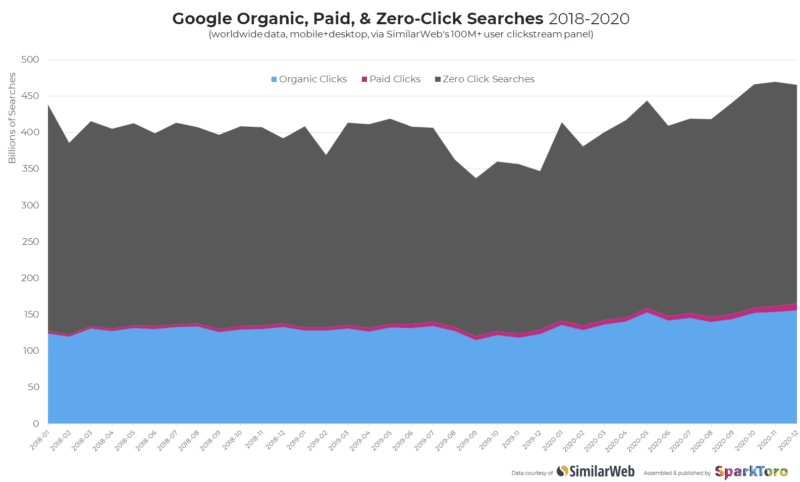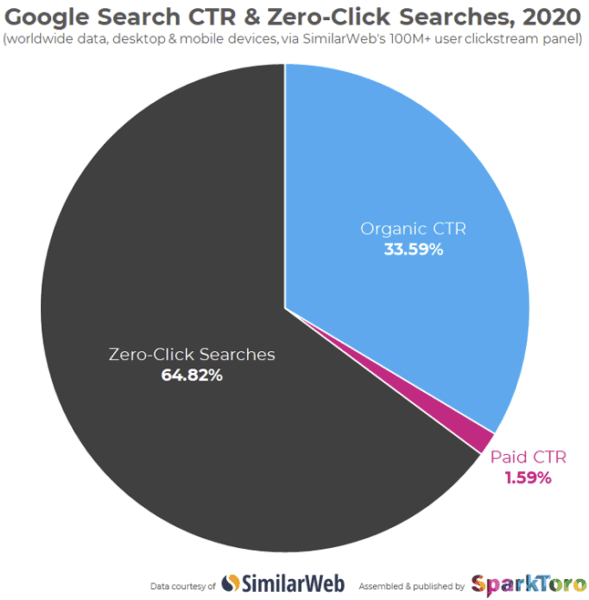Between January and December 2020, nearly 65% of Google searches ended without a click to another web property — up from 50% in June 2019, according to a SimilarWeb study published by Rand Fishkin, founder of SparkToro.

On desktop, 46.5% of searches were zero-click, compared to 77.2% on mobile devices.
Methodology caveats. This latest statistic and the 50% figure from 2019 did not come from the same data provider and included different searching methods. The new data, from SimilarWeb, includes a pool of 5.1 trillion worldwide Google searches and combines both mobile and desktop devices, including iOS devices. The data Fishkin used in 2019, from now-defunct clickstream data provider Jumpshot, included only one billion web browser searches from domestic desktop and Android devices.
“Nonetheless, it seems probable that if the previous panel were still available, it would show a similar trend of increasing click cannibalization by Google,” Fishkin said in his analysis.
More searches, possibly due to COVID. After a dip in 2019, overall search volume grew in 2020, perhaps due to shifting behavior as people adjusted to life during the coronavirus pandemic.

As COVID cases trend downward and people become more mobile, the proportion of overall zero-click searches could rise since they are more common on mobile devices than on desktop.
Zero-click searches and market dominance. Zero-click searches may mean that users’ queries are resolved right on the results page. By displaying ads or its own products, Google can extract value from zero-click searches, while other sites might not. This can be especially troublesome considering Google sources much of the content that appears on its results pages from publishers, and as the proportion of zero-click searches increase, publishers may be losing out on traffic.
While zero-click searches have risen, Google’s dominance in search and digital marketing continues to be at the heart of legal battles and discussions across the globe. Domestically, 10 state attorneys general filed a lawsuit in December, claiming that Google colluded with Facebook to curtail header bidding. Abroad, Google threatened to shut down its search engine in Australia if the country passed a News Media Bargaining Code which could force the company into binding arbitration agreements with publishers.
In September 2019, SEOs said that the outcomes of congressional and DOJ investigations into Google were the least likely to have a large impact on the sector over the following three years — that point of view looks increasingly justified. More recently, new information regarding why the FTC didn’t sue the company in 2013 was made public, reigniting conversations about regulating the market leader. Even so, recent attempts by regulators abroad seem to have floundered: The Android search choice screen, which was part of Google’s effort to comply with the European Commission’s July 2018 antitrust ruling against it, has had virtually no effect on its market share. And, the Australian News Media Bargaining Code’s momentum seems to have slowed down as more publishers agree to Google’s News Showcase, the company’s own proposal for compensating news media organizations.
Why we care. The impact of zero-click searches is not evenly distributed across sectors: businesses in industries that Google competes with, such as online travel agencies or review platforms, may be losing a greater share of traffic than other businesses. Overall search volume has increased, which may mean more opportunities for businesses that Google doesn’t directly compete with.
Optimizing for featured snippets and adding schema markup may help your business drive awareness: “Rich information appearing in Google’s results may be, like billboard ads or press mentions, harder to track than website traffic, but it’s still exposing your brand name to an audience, building familiarity, and sharing information,” Fishkin previously told Search Engine Land, “In my opinion, the brands that find ways to benefit from that type of SERP exposure, even without a click, will be the ones who win at this new form of on-SERP SEO.”
The post Zero-click Google searches rose to nearly 65% in 2020 appeared first on Search Engine Land.
Source: IAB

